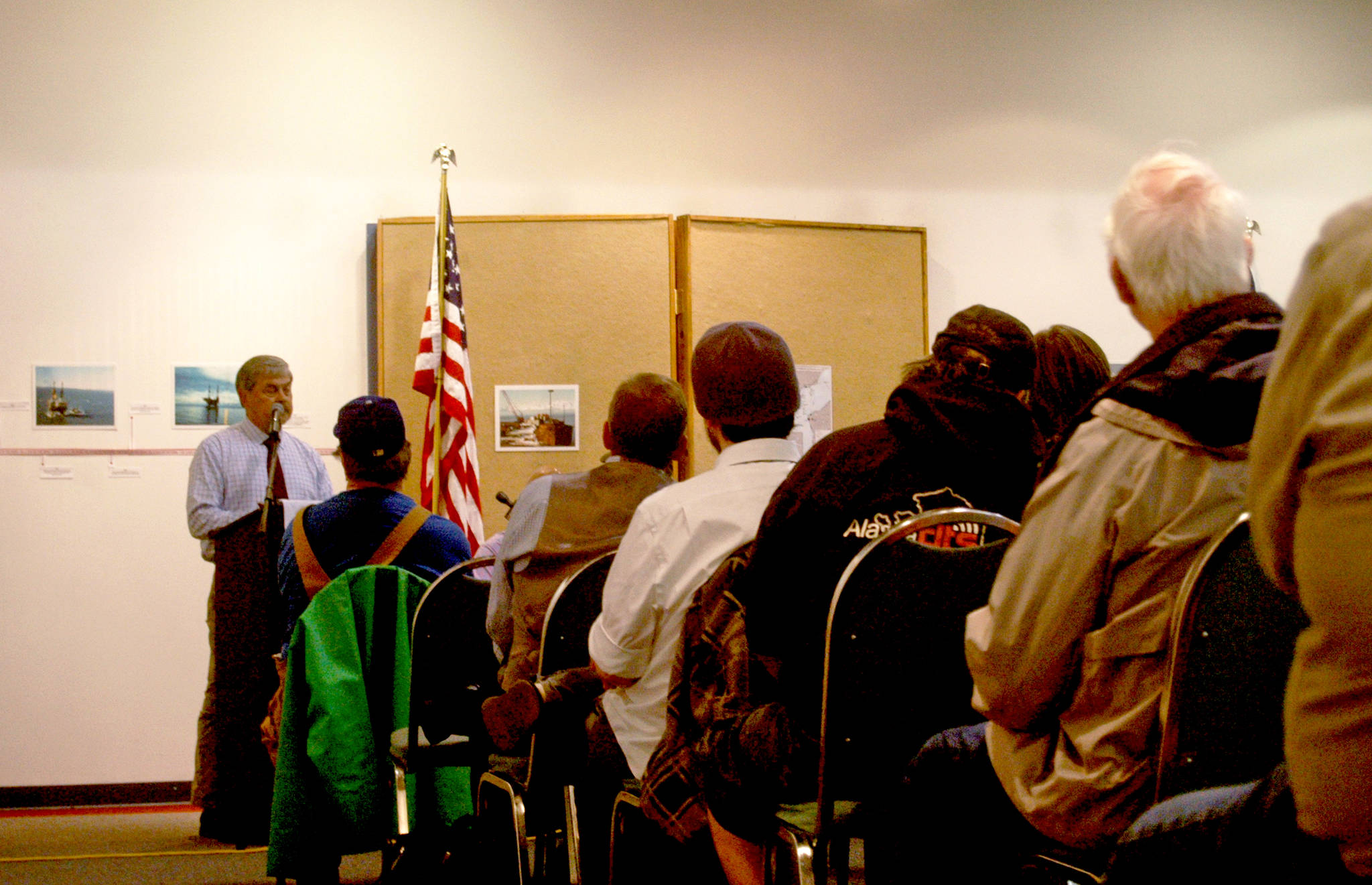Though multiple bills have overhauled the criminal justice system in Alaska in the past few years, the tone of discussion on crime on the central Kenai Peninsula hasn’t changed much.
People still readily packed out a public meeting Monday to express their frustration with the crime rate in the area, particularly property crime and repeat offenders. More than 50 people filled the chairs at a town hall meeting hosted by Sen. Peter Micciche (R-Soldotna) with a number of state criminal justice officials — including Kenai Police Chief Dave Ross and Alaska Department of Public Safety Commissioner Walt Monegan — to voice similar concerns about crime rates that they have been for about the last five or six years.
Much of the commentary at the meeting was focused on Senate Bill 91, an omnibus criminal justice reform bill the Legislature passed in 2016. The bill was meant to reduce the incarcerated population in the state and address other systemic issues, such as increasing the mandatory minimum sentence for murder and changing the state’s bail system. However, because it reduced the penalties for some lower-level crimes like car theft and first-time drug offenses, many saw it as exacerbating the problem of serial theft.
“I voted for the bill, along with almost everyone in the Legislature,” Micciche said at the meeting. “And it became quite apparent soon afterward that we had some things to correct.”
Micciche said the Legislature has passed a number of bills making adjustments to the changes made in SB 91 but that further substantive changes will be needed.
The leaders of the Alaska Department of Law are meeting to discuss recommendations for changes to make to the governor but are not ready to make them public yet, said John Skidmore, the director of the Department of Law’s criminal division. The Department of Law has recommended the Legislature not completely repeal SB 91, as some senators were ready to do, because the law contained some positive changes and revoking it would go back to a system that needed changes, Skidmore said.
Though the overall number of felony referrals the criminal division has received has been going down since 2014, the number of more serious crimes — like kidnapping and assault — has been going up, Skidmore said. The largest area of decrease is in drug crimes, which was downgraded from a felony to a misdemeanor.
“The number of felony assaults we have filed in the last five years has gone up dramatically,” he said. “The number of felony assaults has gone up. The number of felony property offenses has gone up. Those are all indicative to us that there are issues there … what’s important to us is that our office is seeing, while there’s fewer felonies, we have more of what I consider to be more serious felonies.”
Ross said Kenai, like many communities around Alaska, has been seeing a steady increase in crime. He told the crowd that the Kenai Police Department’s total number of arrests increased 20 percent last year, with reports of burglary and vehicle theft up. The state needs to take a look at repeat offenders particularly, he said.
“We’re dealing with a plethora of low-level crime,” he said.
The Soldotna Police Department is dealing with similar crime statistics, said Sergeant Duane Kant at the meeting. The increase isn’t unique to the peninsula — the Alaska State Troopers are seeing it in their jurisdiction as well, said Alaska State Troopers Director Hans Brinke.
Brinke, Monegan and Public Safety Employees Association President Doug Massey all emphasized the problem with recruitment for the Alaska State Troopers. The state has had trouble attracting, hiring and retaining troopers, and though there are more trainees in the academy now than in the past, it’s still going to be a struggle to keep up with workforce, Monegan said.
Massey said it takes about $200,000 to train a trooper to be ready for service. On top of that, many of the command staff are eligible for retirement or soon will be. The public safety employees union and department leaders have been working together on legislation to increase pay for troopers to help, but it may not solve the problem immediately, he said.
“If you just add more positions right now that doesn’t fix the problem,” he said. “We need to fill the vacancies we have now.”
Skidmore also said budget cuts have affected the criminal division because of the loss of staff. The Legislature has added some funds back, which helps, but that to do an effective job, the division needs enough funding to pay enough staff.
Many of the attendees who commented expressed frustration at watching people who are arrested be released again and reoffend. The state has been working on ways to reduce recidivism — the rate at which people who serve time in prison commit crimes again and return to jail — and SB 91 was in part meant to address that. A number of people said they specifically came because they wanted to see an arrest in the case of Kasilof-area resident Travis Stubblefield, who died June 21 after a conflict in a Kasilof home. Skidmore said the investigation is ongoing in that case and the criminal division has not received a criminal charge referral from the Alaska State Troopers, who are investigating the circumstances of that case.
Most people who spoke urged the state to be tougher on criminal sentencing, with longer sentences and some asked for the Legislature to establish a capital punishment structure. Micciche said the Senate Majority agreed that the law should be tougher on criminals and that he wanted to see offenders with a substance abuse issue be offered an alternative of drug treatment or incarceration.
Reach Elizabeth Earl at eearl@peninsulaclarion.com.

